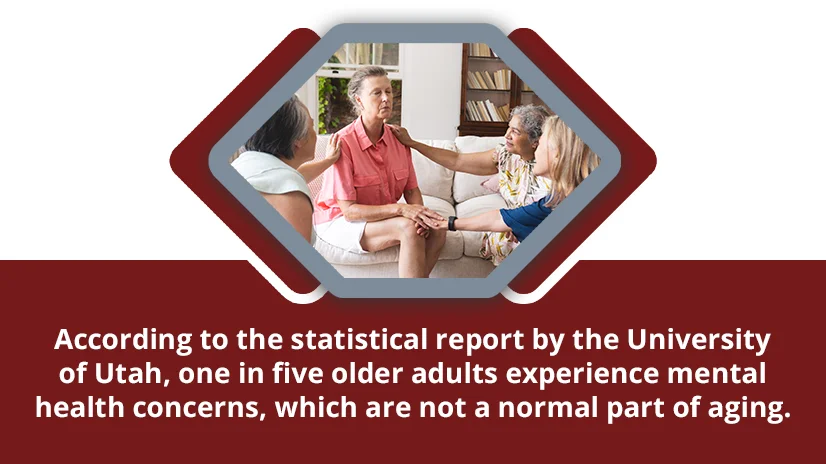
Mental Health Therapy Programs For Seniors
Many older adults struggle with depression or anxiety, which can significantly impact their physical well-being. These mental health challenges are not just a normal part of aging but often stem from factors like loneliness or chronic health conditions.
Mental health therapy for seniors provides essential support, offering a safe space for seniors to discuss their feelings and develop effective coping strategies. Therapy can help manage stress levels, improve mood, and enhance overall quality of life.
Continue reading to learn about several therapy programs to help elders regain control in life.
Key Takeaways
Mental health issues in seniors are significant and require targeted support and intervention. Here’s what you need to know:
- Therapy options for older adults, including CBT and creative therapies, are effective in improving seniors’ mental health.
- Choosing the right therapy involves considering various factors, such as accessibility and financial factors.
- Family and caregivers play a vital role in supporting therapy adherence and recognizing early symptoms.
Indiana Center for Recovery helps seniors with mental illness. Call (844) 650-0064 today to avail yourself of our services.

Statistics On Mental Health Challenges In Seniors
Mental health challenges in seniors are significant and often overlooked. According to the statistical report by the University of Utah, one in five older adults experience mental health concerns, which are not a normal part of aging. In upcoming years, the number of people aged sixty and older with psychiatric disorders in the U.S. is expected to reach fifteen million. Despite this, up to sixty-three percent of older adults with mental health disorders do not receive the services they need.
Life changes and relationship issues often affect this age group, leading to low self-esteem and emotional health problems. Panic attacks and unresolved issues can also arise. Alzheimer’s disease (AD) affects over 5.7 million people in the U.S. and more than 50 million worldwide. The number of people in the U.S. afflicted with AD and other related dementias is anticipated to triple to fourteen million by 2050.
People of all ages can struggle with mental health problems, but seniors face unique challenges during their golden years. Addressing these issues is vital for their overall well-being. Raising awareness can help seniors receive the care and support they need to enjoy their later years.
Common Mental Health Issues Among Seniors
As the aging population grows, understanding mental health issues among older people becomes increasingly important. Seniors face unique health issues and challenges that can significantly impact their mental well-being.
Alzheimer’s Disease
Alzheimer’s is a neurological disorder that primarily affects older people. This mental illness leads to memory loss, cognitive decline, and difficulties with daily activities. Signs include confusion, mood disorders, and behavioral changes. Alzheimer’s impacts the aging population significantly, leading to a loss of independence.
Depression And Anxiety
Depression and anxiety are the most common mood disorders among seniors. They can be triggered by physical changes, social isolation, grief, and chronic illness. Signs include persistent sadness, loss of interest in activities, and excessive worry. The mental effects of these conditions can be severe and affect overall health and quality of life.
Dementia And Cognitive Decline
Dementia encompasses various conditions that cause cognitive decline, affecting memory, thinking, and reasoning. Signs include confusion, difficulty in communication, and impaired judgment. Chronic illness, neurological disorders, and aging are major contributors. These issues often lead to a significant loss of independence for older people.
Substance Abuse
Substance abuse in seniors is an often overlooked issue. It can result from chronic pain, social isolation, and grief. The mental effects include an increased risk of depression, anxiety, and other health issues. Recognizing signs such as changes in behavior and increased use of medications is crucial for addressing this problem effectively.
Types Of Mental Health Therapies For Seniors
As seniors face unique mental health challenges, various therapies are designed to address their specific needs. Senior counseling and other forms of mental health support can greatly improve their chances of recovery. Here are some common types of mental health therapies for older people:
Cognitive Behavioral Therapy (CBT)
CBT is an effective form of behavioral therapy for treating anxiety disorders and depression in seniors. It involves attending a session with a mental health professional to identify and change negative thought patterns. This therapy helps older adults develop coping strategies, improve mood, and manage stress better.
Dialectical Behavior Therapy (DBT)
Dialectical behavior therapy (DBT) is a beneficial therapy designed to help people manage negative thoughts and emotions and improve relationships. DBT combines cognitive-behavioral techniques with mindfulness practices. It is especially useful for individuals with borderline personality disorder. However, it can also help with depression, anxiety, and other mental health issues.
Group Therapy
Group therapy offers seniors a supportive environment to share their experiences and feelings with others facing similar challenges. Led by a mental health counselor, these sessions promote social interaction and provide resources for coping with mental health issues. Family therapy can also be included to address the dynamics and support within the family unit.
Individual Therapy
Individual therapy sessions involve one-on-one sessions with a therapist to address personal challenges and mental health issues. The therapist provides a safe setting to explore thoughts, feelings, and behaviors, helping you develop coping strategies and solutions.
Therapy may focus on various aspects, such as managing anxiety, depression, or relationship issues. Through tailored techniques and supportive dialogue, individual therapy aims to improve self-awareness, emotional regulation, and overall well-being.
Family Therapy
Family therapy for seniors focuses on improving communication and relationships within the family. It helps address caregiving challenges, intergenerational conflicts, and adjusting to changes like retirement or health declines.
A therapist guides family members in understanding each other’s perspectives, resolving conflicts, and supporting the senior’s emotional and physical well-being. This therapy strengthens family bonds, reduces stress, and enhances the overall quality of life for seniors and their families.
Group Therapy
Group therapy offers seniors a supportive environment to share their experiences and feelings with others facing similar challenges. Led by a mental health counselor, these sessions promote social interaction and provide resources for coping with mental health issues. Family therapy can also be included to address the dynamics and support within the family unit.
Art And Music Therapy
Art and music therapy are creative therapies for mental health support that benefit seniors. These therapies allow older adults to express themselves nonverbally through art and music, which can be particularly helpful for those with cognitive impairments or anxiety disorders.
Engaging in creative activities helps reduce stress, improve mood, and enhance overall mental well-being. Various senior living communities offer these therapy programs to improve seniors’ body movements and help them rebuild their daily lives.
Considerations When Choosing A Therapy Program
Choosing the right therapy for seniors involves evaluating several important factors to ensure effective mental health care. Here are key considerations:
Specific Needs And Preferences
Each senior has unique mental health needs and preferences. It’s essential to match therapy options with their specific needs, whether they’re dealing with mental disorders or substance use disorders. Assessing their interests, goals, and comfort levels helps select the most suitable mental health services. Engaging in discussions with adult children can also provide valuable insights.
Accessibility And Mobility Concerns
Accessibility and mobility are critical factors when choosing therapy. Seniors may have physical limitations or require special accommodations.
Therapy options should be easily accessible at senior centers, community-based organizations, or telehealth services. Ensuring that therapy locations are convenient and accommodating supports better participation and engagement.
Insurance And Financial Factors
Insurance coverage and financial resources play a significant role in therapy selection. Understanding what mental health services are covered and the associated costs helps make informed decisions. Consideration of insurance plans and available financial support is crucial to avoid unexpected expenses.
Cultural Sensitivity And Language Barriers
Cultural sensitivity and language barriers must be addressed to ensure effective mental health care. Therapists and psychiatrists should be aware of cultural differences and be capable of providing services in a language the senior understands. Access to support groups and resources that respect cultural backgrounds enhances the therapeutic experience.
Benefits Of Mental Health Therapy For Seniors
Mental health therapy offers numerous benefits for seniors, addressing their unique needs and improving their overall well-being. One major benefit is the effective treatment of depression.
Therapy provides seniors with strategies to manage their emotions and cope with lifestyle changes. Clients can find a safe place to express their feelings and concerns by working with a therapist.
Therapy also helps in managing cognitive impairment. Seniors with cognitive issues can benefit from structured therapeutic activities that enhance cognitive function and slow decline.
Mental health therapy can improve the quality of life by fostering better mental health and emotional stability. It encourages social interaction and reduces feelings of isolation, common among older adults.
Additionally, many seniors have access to therapy through Medicare, making it more affordable. This financial support allows more seniors to benefit from professional mental health services. Overall, mental health therapy addresses the unique needs of seniors, offering them tools to lead healthier and more fulfilling lives.
Frequently Asked Questions (FAQ)
The best therapy for older people often depends on their specific needs. Cognitive behavioral therapy (CBT) is highly effective for managing depression and anxiety. For those with cognitive impairments, therapy can help improve mental function.
Individual therapy offers personalized support, while group therapy provides social interaction and shared experiences. Art and music therapy are also beneficial for expression and emotional relief. Consulting a mental health professional is crucial to determining the suitable therapy based on individual conditions and preferences.
Staying active and engaged can improve seniors’ mental health. Regular exercise, hobbies, and activities can boost mood and cognitive function. Building and maintaining social support through friendships and family connections helps combat loneliness and offers emotional support.
Keeping a routine, setting goals, and staying mentally stimulated with work or learning new skills can also enhance well-being. Moreover, seeking professional help from a therapist or counselor when needed is important. Overall, a combination of social interaction, mental stimulation, and physical activity can greatly improve mental health for seniors.
The most common mental health disorders among older adults include depression, anxiety, and cognitive decline. Depression often results from loss, chronic illness, or social isolation. Health issues or life changes can trigger anxiety.
Cognitive decline, including conditions like dementia and Alzheimer’s, affects memory and thinking skills. Substance abuse can also be a concern, often linked to coping with chronic pain or emotional struggles. Recognizing these issues and seeking appropriate treatment is crucial for maintaining mental well-being and quality of life in older adults.



